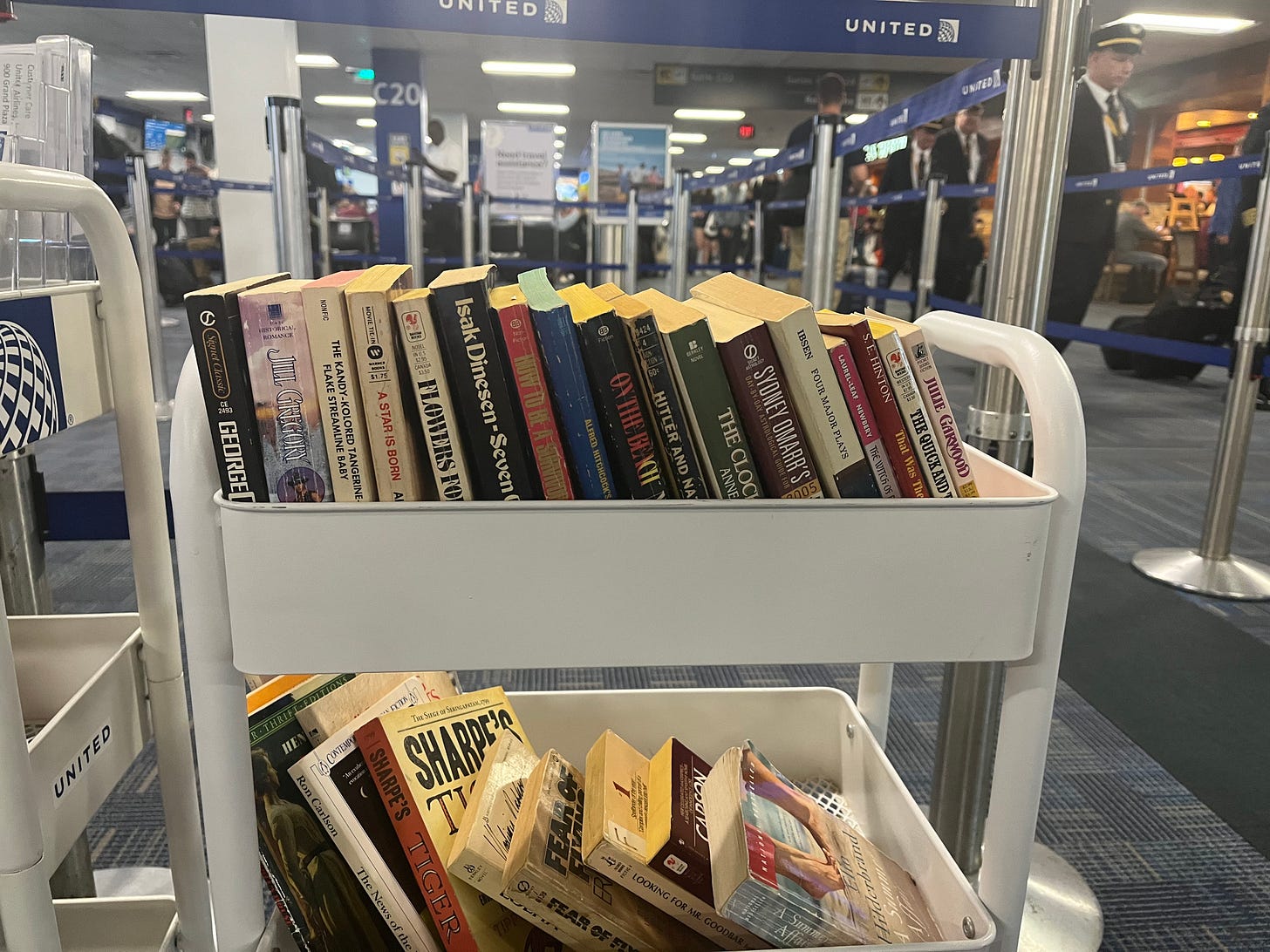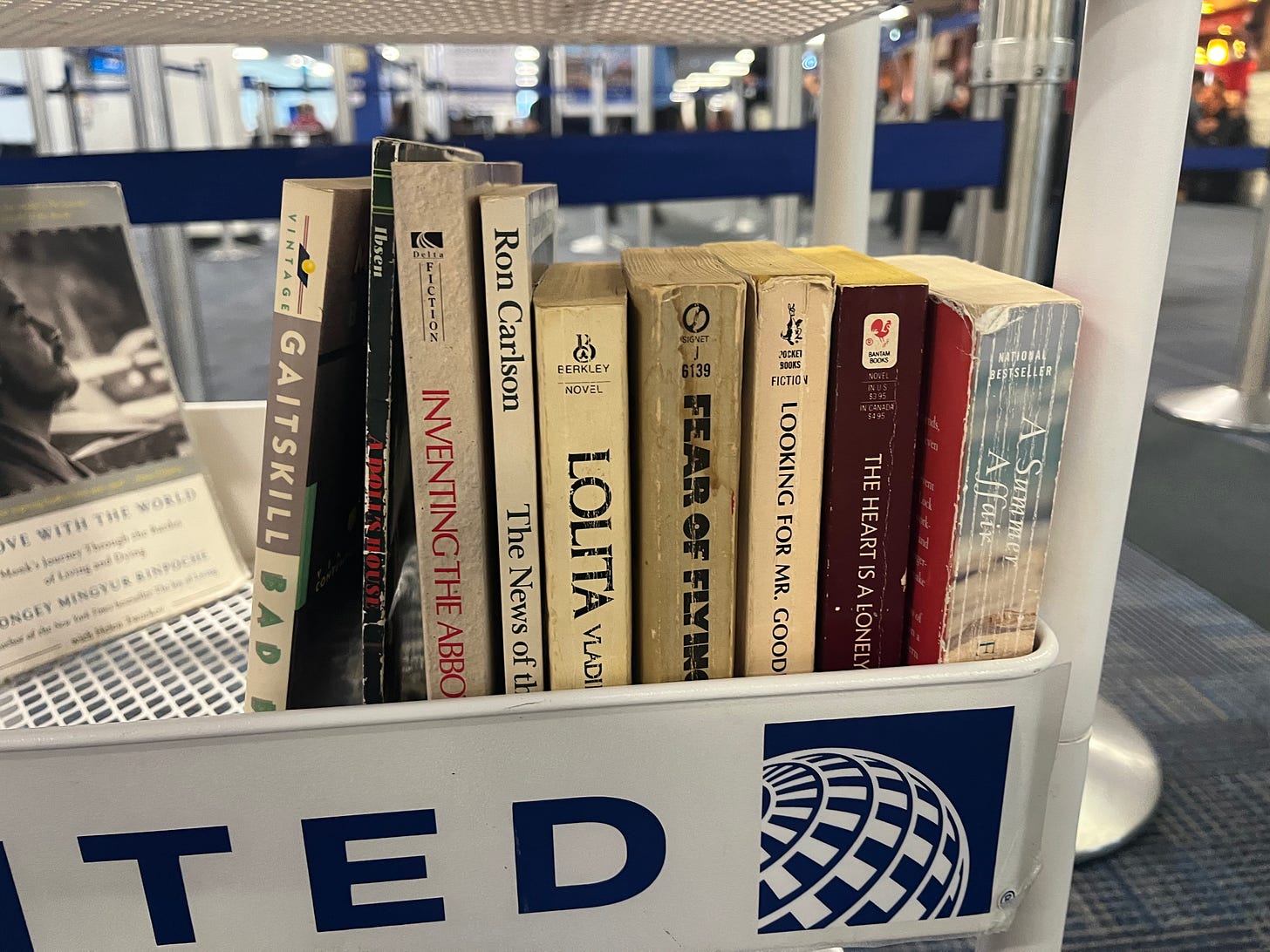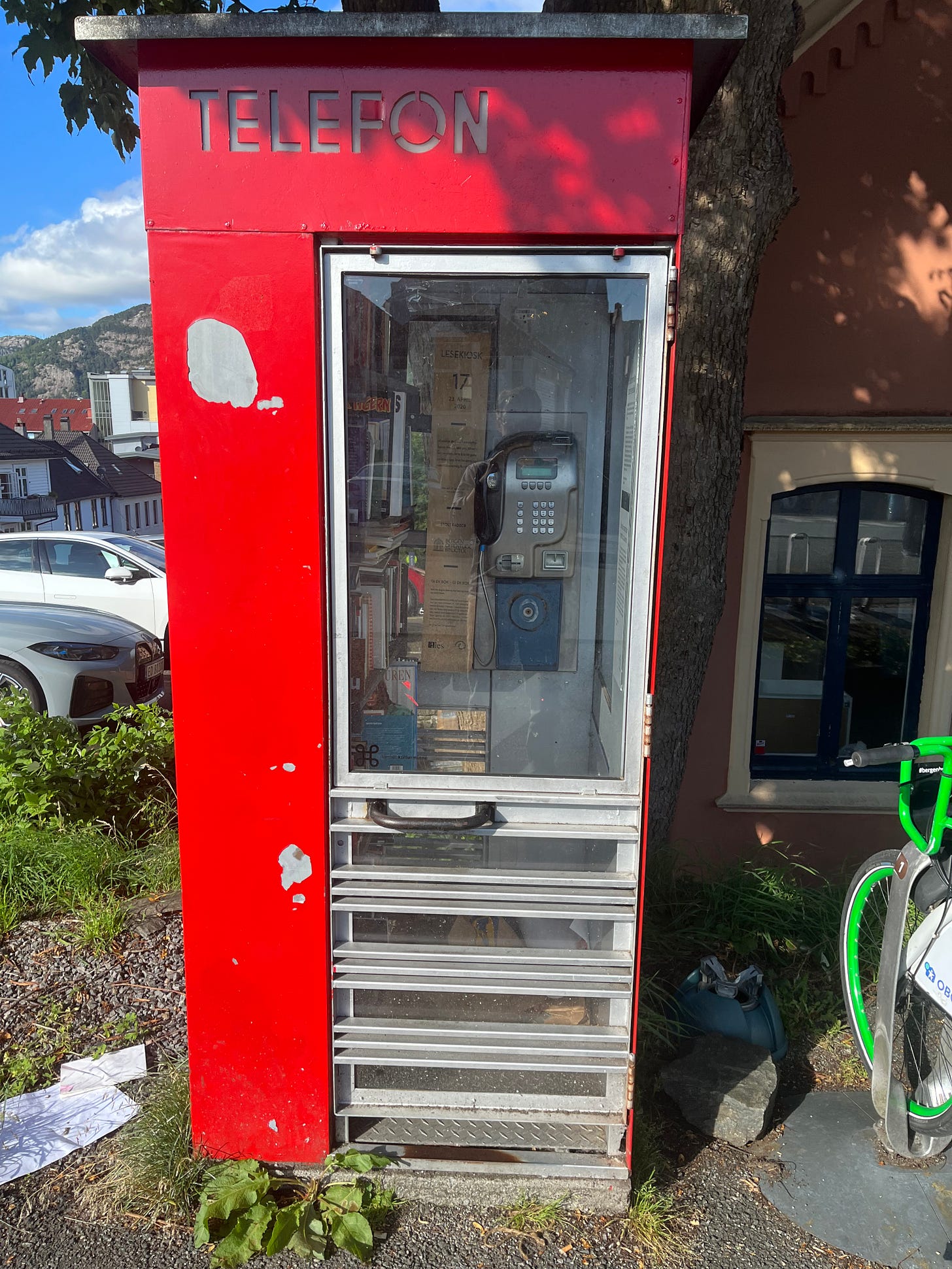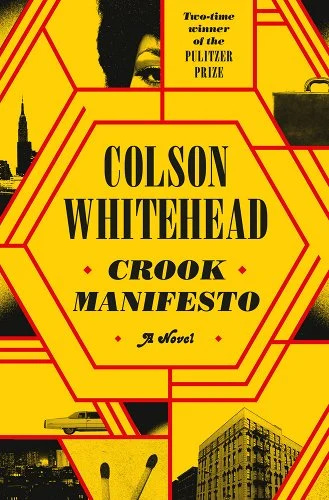On our way to Norway for our recent - still ongoing as I write this - trip, I came across a cart of free books in the Washington - Dulles airport.
I usually have low expectations of the opportunity for interesting reading from these piles of obvious castoffs, but as I zoomed in, things got interesting.
I mean, not bad. I could read happily from that little selection for a few weeks or more. Whoever did the selecting is a fan of underappreciated contemporary American short story writers (Mary Gaitskill’s Bad Behavior and Ron Carlson’s The News of the World,) two fantastic collections.
Lolita, Looking for Mr. Goodbar, and Fear of Flying would be an interesting start to a syllabus about portrayals of sex and desire rooted in the specifics of American culture.
I’ll also note that the skinny volume where the title is hard to make out is Henrik Ibsen’s A Doll’s House, a sort of spooky coincidence given that we were headed to Norway and Ibsen is perhaps the greatest figure in the country’s rich literary legacy.
It seems clear that these are not the books of random passengers doing a take-a-book, leave-a-book thing. There’s hardly anything from the last ten years in the selections. If the requests for recommendations sent to me are any indication of the general public’s reading habits, there should be at least three copies of Amor Towles’s The Lincoln Highway and a Lessons in Chemistry. There was no John Grisham, or Emily Henry, or Colleen Hoover.
To me, they almost look like someone’s personal collection of used books that got swept up and repurposed. I want to know who this person is because of course, I am the type of person who will judge a stranger purely on the books they own, in the case of this hypothetical person, positively. At the times when my wife and I were looking at houses, I would sometimes sour on a place if the books on the shelves displeased me. I recall one contender that had a bunch of “histories” by Bill O’Reilly and Rush Limbaugh and thought that surely that house was not for me.
In every hotel where we've stayed on this trip there’s been a collection of books left behind, free to take.
In Bergen, I’ve walked past a number of old phone booths repurposed into a free book exchange that probably has fifty or sixty books in it. Some of the cafes have little shelves of left-behind volumes.
Most of the books in Norway are written in Norwegian (go figure), so they’re not much use to me, but it isn’t an exaggeration to say that I’ve been in the presence of hundreds, perhaps thousands of free books over the past 10 days.
(I’ll also note that every Norwegian bookstore has an extensive English section, so should you travel here you don’t need to be like me and pack seven books for the trip.)
All those books released to the world really got me thinking. Access to libraries of course means we can always read for free, but libraries aside, it seems entirely possible that someone could indefinitely read happily from books left behind by others they’ve never met.
That would be terrible news for writers like me who depend on the existence of newly published books to make their living, but it’s sort of amazing to think about the sheer mass of collected human experience floating around, available for the taking.
It would be a fascinating experiment to try to do just this for a year, the kind of thing a perceptive and clever writer could turn into a book. (Maybe someone already has.) It’s the kind of book I would love to do, but my dance card is full and professional obligations require me to keep abreast of specific current releases in publishing.
Maybe someday. It’s nice to have future projects in mind, even ones you’ll probably never get to. It’s not so different from buying more books than you’ll ever read and letting them pile up in your house, a process the Japanese call Tsundoku. The idea is that the piles of books represent any number of possible futures you still have the potential to live.
I am a dedicated practitioner of Tsundoku, but seeing all these books liberated and in the world has provided me with some inspiration and an impulse to divest myself of some books that I think others may enjoy, rather than letting those books sit on a shelf…or worse. My wife and I moved into a new house just over a year ago and for that year, a large swath of my books have been sitting in cardboard boxes in our garage. Most of these books are ones published in the early years of McSweeney’s, when a significant part of my compensation for editing the McSweeney’s website was free stuff. I do not want these books moldering in boxes because they are wonderful and unique and represent an exciting time in my life as I was forging a relationship to writing and reading that now appears to be enduring, literally a life’s work.
It’s not an exaggeration to say that I love those books, but unlike the books I have unpacked, they are books that I mostly only look at and it feels better to me to send these books back into the world so they are read.
But I am not going to just start putting these books in Little Free Libraries or used bookstores or bus stop benches. Instead, I’d rather see them wind up in the hands of specific people who will read them, or if not read them, at least gaze upon them with some measure of the same sentiment I have for books.
So, here’s what I’m going to start doing. Each week, via random drawing, one newsletter subscriber will be selected to receive a package of books that will include (while supplies last):
One McSweeney’s-related book.
One other book: These could be books by me, by friends of mine, books edited by me, or simply another book I’ve acquired a over time.
To be eligible for the random drawing, you must:
Be a paid subscriber to the newsletter.
That’s it. Each week, I’ll choose one paid subscriber at random, send them an email offering them the books. If they do not respond, I’ll pick someone else until the books are spoken for.
Each week, I will also give a teaser description of the books and let people try to guess the book(s) in the comments. Anyone who makes a correct guess will either receive a free paid subscription or a free gift subscription if they’re already a paid subscriber.
We’ll start this next week when I’m back among my books and can select the choices for the giveaway, so if you want to be eligible from the get-go make sure to become a paid subscriber. With our current 25% annual subscription discount in honor of
joining The Biblioracle Recommends, it’s almost like a subscription will cost you nothing in net terms if you win one of the drawings!Links
Last Sunday at the Chicago Tribune I wrote about my deep enjoyment of Lydia Kiesling’s new novel, Mobility, and the challenge of writing second novels. This week’s column is not online as of this writing, but I’m sure it’s awesome, even though vacation brain has erased any memory of what it might be about. Buy Mobility at Bookshop. You won’t regret it.
The Booker Prize has announced its long list of nominees.
Keeping with the theme of this week’s column, apparently some Turkish sanitation workers started a free library, drawn entirely from books people had thrown in the trash.
Looking for a good mystery? Esquire has a list of what they’re calling the 50 best of all time.
From McSweeney’s Internet Tendency this week, “Captain Ahab’s Third Hour playing the Claw Machine at Dave and Buster’s.”
And…that’s it for recommendations this week because I truly have been spending almost all my time vacating. Fjords, y’all!
Customized Reading Recommendations
I also don’t have any recommendations this week because I used up every last bit of my supply writing columns in advance of my vacation, so follow the instructions at the link below and you’ll probably get all-time quick service.
Alrighty, folks. Tomorrow I will be on a plane at an ungodly hour hurtling back toward the U.S.A., while reading Percival Everett’s forthcoming novel, James, just as I planned.
Remember to become a paid subscriber in order to be eligible for the exciting book giveaways.
Skol!
John









Wow I really love the photo of the phone booth turned into a mini library. It’s kind of like ivy growing over old houses... like no matter how advanced technology gets, books will endure
I lived in Milwaukee for grad school, and just a few blocks down from us was the best-curated Little Free Library I’ve ever seen. I’d walk our dog by there and I swear, someone must’ve been rotating books on a weekly basis. There was always a strong selection of new or very gently used books, primarily literary fiction. I’ve never seen another one like it, and it’s one of the things I sorely miss about living there. It was one of the few times I’ve felt good about putting books from my own collection out into the wild.